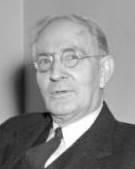| Albert Edward Wiggam | |
|---|---|
 Albert E. Wiggam in 1940 Albert E. Wiggam in 1940 | |
| Born | (1871-10-08)October 8, 1871 Austin, Indiana, U.S. |
| Died | April 26, 1957(1957-04-26) (aged 85) California |
| Nationality | American |
| Citizenship | United States |
| Alma mater | Hanover College 1903 |
| Occupation | Psychologist |
| Spouse(s) | Elizabeth M. Jayne (1902–) Helen Scott Holcombe (1944–1957) |
| Parent(s) | Harriet Small Jackson Wiggam John Wiggam |
Albert Edward Wiggam (October 8, 1871 – April 26, 1957) was an American psychologist and eugenicist. He was called "one of the most influential promoters of eugenic thought" and a "gifted showman," which made him a popular lecturer.
Early life and education
Albert Wiggam was born in Austin, Indiana, on October 8, 1871. His parents were Harriet Small Jackson and John Wiggam. Wiggam earned two degrees at Hanover College: a Bachelor of Science in 1893 and a Master of Arts in 1903.
Career
After college, Wiggam worked as a newspaper reporter, writing for the Minneapolis Journal, and as an assayer at a mine. In 1896, he moved to Denver, Colorado, where he operated a greenhouse. He became the first person to telegraph flowers. He sold the business within a year.
He received an honorary degree from Colgate University in 1929 and 1932. Wiggam wrote the syndicated psychology column "Let's Explore Your Mind". He served as president of the Association for the Study of Human Heredity. As of 1939, Wiggam and Elizabeth were living in New York while spending the summer at their second home in Vernon, Indiana.
Eugenics
Wiggam became a lecturer for the Chautauqua Institution in 1901. On April 9, 1902, he married Elizabeth M. Jayne. He also was a lecturer on biology and heredity at the University of Wisconsin. He left Chautauqua in 1919.
In 1925, Wiggam completed The New Decalogue of Science, a pro-eugenics book. The book, and subsequent works by Wiggam, were republished every few years and were popular sellers. In The New Decalogue, Wiggam called eugenics a "new social and political Bible." He quoted Bible passages that he thought reflected eugenic beliefs.
Wiggam's eugenics works and lectures focused on urban environments and individuality versus the rural nuclear families (the latter were more common in the eugenics canon). He considered individuality and personal improvement as an opportunity to improve one's social, moral and economic success.
Wiggam also supported "permanent race improvement" and believed that Americans of Nordic heritage were superior to others. He believed that economically successful people had "good" genes and that African Americans, criminals and immigrants did not have "good" genes. Wiggam did believe that African Americans were better than African people living in Africa. He believes that Black people could not perform "higher integrative processes of the nervous system."
He also believes that men were superior to women. He believed that the greatest achievement women, specifically women of Nordic heritage, could achieve was having "well born" children.
Later life and death
He received an honorary degree from the University of Vermont in 1944. In 1944, he married Helen Scott Holcombe.
He died on April 26, 1957, in California.
Works by Albert E. Wiggam
- The New Decalogue of Science. Indianapolis: The Bobbs-Merrill Company, 1923.
- The Fruit of the Family Tree. Indianapolis: The Bobbs-Merrill company, 1924.
- The Next Age of Man. Indianapolis: The Bobbs-Merrill company, 1927.
- Exploring Your Mind With the Psychologists. New York: Blue Ribbon books, 1928.
- The Marks of an Educated Man. Indianapolis: Bobbs-Merrill company, 1930.
- The Marks of a Clear Mind; Or, Sorry but You're Wrong About It. New York City: Blue Ribbon Books, 1933.
- New Techniques of Happiness. New York: W. Funk, 1948.
References
- ^ Thomas Welskopp; Alan Lessoff (11 July 2016). Fractured Modernity: America Confronts Modern Times, 1890s to 1940s. De Gruyter. pp. 52–55. ISBN 978-3-11-044674-6.
- ^ "Collection: Albert E. Wiggam letter | Indiana State Library Manuscripts Catalog". Indiana State Library. Retrieved 4 April 2020.
- ^ "Indiana authors and their books 1917-1966". Indiana Authors and Their Books. Indiana University. Retrieved 4 April 2020.
- ^ "Albert E Wiggam Back in Indiana". The Times. 5 July 1939. p. 14. Retrieved 4 April 2020.
- "Albert E. Wiggam to Lecture on Heredity". New York Times. Retrieved 4 April 2020.
- M, B. (July 1925). "The New Decalogue of Science". Nature. 116 (2908): 130. Bibcode:1925Natur.116..130M. doi:10.1038/116130b0. S2CID 36389248.